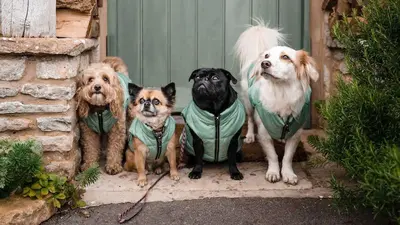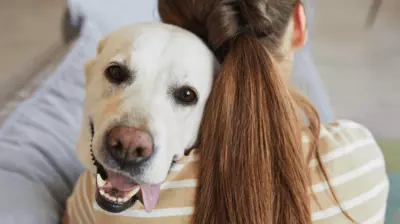Should I Adopt a Rescue Dog?
- 30 Mar 2023
- 7m read

All pups are wonderful in their own ways, but rescue dogs – they have a special place in all of our hearts.
Shelters are overflowing with dogs of every shape, size, breed and age. These lovable pups can make extremely rewarding pets, so take a peek – your new best friend could be just around the corner, waiting patiently to be picked.
Is a Rescue Dog Right for Me?
Rescuing a dog can be an amazing experience. You may have heard bad things about shelter dogs, like they have behavioural problems, for example. But that's often not true.
Responsible shelters will only put dogs up for adoption if they are able to adjust to family life. If not, they’ll rehome these dogs to families without small children, or to those more experienced in managing behavioural complications.
They'll take time to talk you through the process, understand your home and family life, then match you with your perfect pup partner. Even after you and your dog have gone home to start your new life together, they'll be on hand (or paw) to answer questions.
How Much Does a Rescue Dog Cost?
Adopting a dog – whatever breed or mix they might be – is much cheaper than buying a pedigree. You just need to pay the charity's usual admin fee, which is normally less than £200. As shelters are also charities, they will always welcome more generous donations.
Lots of large shelters will supply a dog MOT, while most will provide vaccinations, microchipping, neutering and treatment for any health problems before you can take your new furry family member home.
How to Get a Rescue Dog
Potential rescue pup parents will be pleased to know the adoption process is pretty simple. Once you've thought long and hard and are 100% certain your circumstances are suited to pet parenthood, there are a few hoops to jump through…
1. Find an adoption centre
There are loads to choose from up and down the UK. Try Battersea, Dog's Trust or Blue Cross.
2. Check out potential furry friends online
There are short descriptions of each pooch on rescue sites, which will give you useful information to help you make a great choice.
3. Apply to be a pet parent
You’ll need to fill in some paperwork, so expect to explain more about your home, family and what you’re looking for in a dog. Renters will need proof of a pet-friendly landlord.
4. Visit the pup
If your paperwork is accepted, you’ll be able to see if you and your potential Butternutter click with a real life visit.
5. Home visit
You might need to have a visit from a charity expert to make sure you’ll be the ideal match and your home is suitable for your preferred pup.
6. Welcome your new family member
If the shelter gives you the OK, all that’s left is to introduce your pup to their brand-new home. Say a big woofing welcome to your new family member.
How to Help a Rescue Dog Settle In
The first and biggest priority when bringing a rescue dog back to their new home is helping them to settle in and feel comfortable in their new surroundings. There are a few things you can do to make them feel like they're part of the family:
Give them a tour of their new home
When you first bring your new pup home, keep them on their lead and take them around each room of the house, as well as any gardens or yards. Be mindful to avoid showing your dog any rooms that you will not be allowing them to go into, for example bedrooms.
Give them a safe space
You should ensure to give your dog a dedicated space that they can go to if they feel uncomfortable. Often, this may be a bed or crate in the corner of a room. Refrain from bothering your dog whilst they’re in this space so that they can be confident that they are safe.
Dog-proof your home
Similarly to puppies, bringing a rescue dog into your home can be problematic if they lack training. There are steps you can take to minimise the chances of them harming themselves or worse, escaping.
- Do not leave chewable items lying around, e.g. shoes, books and houseplants
- Ensure that gardens and yards are surrounded by a secure fence
- Do not leave doors and windows open around an unsupervised dog
- Keep toxic items out of reach, e.g. cleaning products, weed/slug killer, chocolate, grapes
- Remove ground-level hazards, such as electrical wires, which they can trip over or chew
How to Train a Rescue Dog
Training a rescue dog can be a rewarding experience, but you will need to commit to patience and consistency, as well as having a good understanding of your dog's behaviour and needs. You should be mindful to expect a period of adjustment.
Often, shelters aren’t aware of what a dog’s past life looked like. Those that were subjected to mistreatment or abuse can be triggered by certain objects or sounds. That doesn’t make them impossible to train, it just makes the process a bit longer and more challenging.
Here are some helpful tips to consider when training a rescue dog:
Build a strong bond with your dog
First and foremost, ensure that you spend plenty of time with your dog to establish trust and respect. Use positive reinforcement techniques, such as treats, praise, and playtime to build a positive association with you as their new owner.
This part can’t be rushed. Each dog is different and it can take anywhere from months or years for them to be fully comfortable with you.
Teach basic obedience commands
To begin with, start small with basic commands like "sit," "stay," "come," and "heel." Again, ensure to use positive reinforcement techniques to encourage your dog to obey and reward them when they do.
Socialise your dog
Introduce your dog to new people, places, and other animals gradually, in a controlled environment. This will help your dog develop confidence and reduce anxiety.
Practice regularly
Consistency is key when training a rescue dog. Set aside regular training sessions and be patient but persistent in your approach. Changing routines often can cause stress to a rescue dog. At first, you should train them in the same places and keep their food and water in the same spot.
Seek professional help
If you are having trouble training your rescue dog, consider seeking the help of a professional dog trainer or behaviourist.
Why You Should Consider Rescuing
Purebred pooches are often sold as puppies and make up the majority of dogs in the UK. Pet lovers might seek them out because they like the history of their breed, their characteristics or just their looks – think of the adorable wrinkles of a Shar Pei or a basset hound's floppy ears. Unfortunately, the most popular puppy breeds are usually trendy dogs that can become fashion accessories rather than pets to be doted on.
Case in point: the popularity of fashionable French Bulldogs has rocketed by almost 3,000% in the last ten years. Some pedigree breeds, such as Pugs and Cavalier King Charles Spaniels, are known to have genetic health problems. These can be made worse by irresponsible breeders who try to keep up with demand by breeding them intensively.
As fashionable breeds get more, well, fashionable, less trendy dogs sit in shelters. There are numerous advantages to welcoming a rescue pup into your family, just paws for a moment and give it some thought.
If you adopt a rescue pooch, you’ll be opening up a space for other dogs in desperate need of love and care. The more people turn to adoption, the less custom there'll be for puppy farms.
Butternut Box Supports Rescue Shelters and Charities
If you already have the perfect pooch, but you still want to help rescue dogs, there’s something you can do. Each time a new customer signs up to Butternut Box, we donate a delicious and desperately needed meal to a dog that's homeless or in a shelter through Foal Farm or Mayhew.




